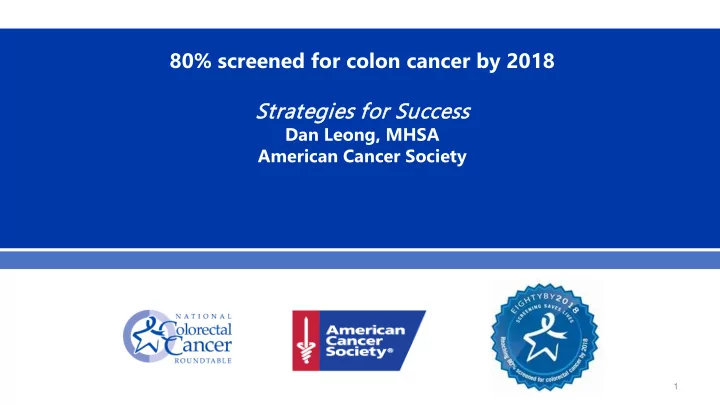

80% screened for colon cancer by 2018 Strateg egies es for S Success ess Dan Leong, MHSA American Cancer Society 1
How Does Colorectal Cancer Start? Most colorectal cancers begin as a growth called a polyp on the inner lining of the colon or rectum Some types of polyps can change into cancer over the course of several years, but not all polyps become cancer. The chance of changing into a cancer depends on the kind of polyp. The 2 main types of polyps are Adenomatous polyps (adenomas): These polyps sometimes change into cancer. Because of this, adenomas are called a pre-cancerous condition . Hyperplastic polyps and inflammatory polyps: These polyps are more common, but in general they are not prcancerous .
Who’s at Risk for Colorectal Cancer Personal history of Polyps Colorectal cancer Inflammatory bowel disease Ulcerative colitis Crohn’s disease Family history of Colorectal cancer or polyps Hereditary syndrome (FAP, Lynch Syndrome,…) People with these conditions are not candidates for stool tests; must be screened with colonoscopy.
Case to increase screening • Colorectal cancer is the third most common cancer in both men and women. • Cancer is responsible for $130 billion a year in lost productivity. • Costs for one year of treatment for late-stage colorectal cancer are as high as $310,000. • Americans spend $14 billion on treatment for late-stage colorectal cancer each year. • Screening tests look for cancer before signs and symptoms develop .
ACS Colorectal Screening Options • Options for Average risk adults age 50 and older • Tests That Detect Adenomatous Polyps and Cancer • Colonoscopy every 10 years • Flexible sigmoidoscopy (FSIG) every 5 years, or • Double contrast barium enema (DCBE) every 5 years, or • CT colonography (CTC) every 5 years • Tests That Primarily Detect Cancer • Guaiac-based fecal occult blood test (gFOBT) with high test sensitivity for cancer – annually* • Fecal immunochemical test (FIT) with high test sensitivity for cancer – annually* • Stool DNA test (sDNA), with high sensitivity for cancer – every 3 years* • * * If the test is positive, a colonoscopy should be done.
New Study- Younger Adults Feb 2017
Kansas CRC Screening Rates
Kansas Medicare Claims Data
National Colorectal Roundtable Priorities CRC screening rates increased 10% in 10 years, from 2000 to 2010 We are now striving to increase screening rates by 15% in 5 years. Signing a pledge is not enough. Every organization has to dedicate thought, time, and passion. 9
Number of People Need to be Screened for CRC to Reach 80 x 2018 by State Number of People who Need to be Screened > 2 million 10
Healthcare Characteristics People Who Are Not Up-to-Date with CRC Screening Have not Visited PCP in Past 12 Months, 34% Visited PCP in the Past 12 months, 66% 11
Steps to Success 1. Commit Sign the pledge/commit to the 80% by 2018 goal. Know your baseline screening rate and background 2. Get started information on screening coverage under your company’s insurance plan(s). Use the Employer Challenge Guide and your creativity to 3. Take action educate and promote screening to employees at least twice each year. Track your screening rate at least annually (quarterly is 4. Track better) and share with your ACS project contact annually. Talk about the great work you are doing, and share your 5. Share ideas and successes with your employees, the community, and your project contact.
1. Make the commitment • Our company will work to reach 80% of eligible employees screened for colon cancer by 2018. • Sign the pledge and make it official! 14
Efforts in Kansas Colorectal Work Groups Health Systems/Hospitals Kansas Cancer Partnership (KDHE) Promotional Material State Plan BCBSKS KAMU 15
80% by 2018 RESOURCES NCCRT.ORG 16
Thank You! Questions? • Dan.Leong@cancer.org • 785.438.5604 17
Recommend
More recommend